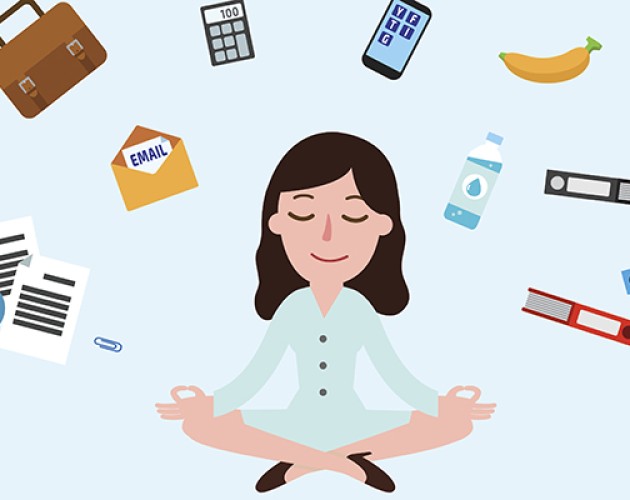Mental Health Care for All

October 10 marks World Mental Health Day—nearly 18 months since the onset of COVID-19. The pandemic has certainly up-ended everyone’s lives, causing drastic tolls on our physical and mental well-being.
We’re concerned about our own health and that of our family and friends. We navigated the transition to working or schooling remotely, which only increased our feelings of isolation. We’re finding new paths to in-person work and school. The economic toll of these past 18 months has called job security into question. We ask ourselves, “Do I dare turn on the news and hope to hear something uplifting?”
Feelings of dread, anxiety and hopelessness have hit each of us in our own ways.
From January to September 2020, more than 1.5 million people took a screen questionnaire and accessed immediate resources and support through the Mental Health America Online Screening Program. The findings included:
“The number of people looking for help with anxiety and depression skyrocketed. In that time period, 315,220 people took the anxiety screen, a 93-percent increase over the 2019 total number of anxiety screens. More than 534,000 people took the depression screen, a 62-percent increase over the 2019 total number of depression screens.
“The number of people screening with moderate to severe symptoms of depression and anxiety continues to increase throughout 2020 and remains higher than rates prior to COVID-19. In September 2020, the rate of moderate to severe anxiety peaked, with more than 8 in 10 people who took an anxiety screen scoring with moderate to severe symptoms.”
Normalizing Mental Health Treatment
Despite the growing population of people identifying and coping with a mental health disorder, there’s still a stigma surrounding openly talking about this. But there’s room for optimism as the mental health crisis is being taken more seriously:
During the World Health Assembly in May 2021, governments across the globe “recognized the need to scale up quality mental health services at all levels,” endorsing the organization’s Comprehensive Mental Health Action Plan 2013–2030.
Our U.S. government is no exception. The CDC reports that one in four adults have experienced symptoms of anxiety and depressive disorder in February 2021, a significant increase from the previous year.
Misdiagnosis has significant implications in limiting the opportunity for adequate treatment. Reports also suggest that these differences are mainly attributable to racial-ethnic bias or misattribution of psychotic symptoms.
—Psychiatry Online Report
Equity in Mental Health Treatments
Steps are being taken to address the disparities that underserved communities—especially those of color and LGBTQI+—face.
“Suicide rates are disproportionately high among Black youth, and LGBTQI+ persons are at disproportionate risk of death by suicide as well as suicidal ideation, planning and attempts,” President Biden writes in a briefing statement. “That is why the American Rescue Plan includes substantial investments to promote mental health among the health care workforce. We are also building on the progress made through the 21st Century Cures Act by integrating mental health and addiction treatment into primary care settings, schools and homes.”
While acknowledging that there is a mental health crisis is a step forward, there’s still work to be done—across cultures and socioeconomic statuses.
Studies from the American Psychological Association (APA) show that underserved communities face significant gaps in accessing mental health treatment.
“For individuals diagnosed with depression, 69 percent of Asians, 64 percent of Latinos and 59 percent of African Americans do not access mental health treatment, compared with 40 percent of non-Latino whites,” the study shows. “These ethnic minority populations cite difficulty accessing care and anticipation of low-quality care as reasons for not seeking the services they need.”
A recent report from Psychiatry Online suggests that the problem is multifaceted, including a lack of community-based interventions, unequal access to evidence-based practices and a lack of resources to fund health services.
“Individuals in racial-ethnic minority groups are 20–50-percent less likely to initiate mental health service use and 40–80-percent more likely to drop out of treatment prematurely. They are more likely to utilize psychiatric emergency services, to enter emergency treatment by means of law enforcement and to be involuntarily hospitalized. They are less likely to receive regular outpatient care after discharge. They are also less likely to experience symptom remission and less likely to improve their global functioning to return to work.
“Unconscious bias and stereotypes have a major impact,” the report continues. “For instance, African American patients are more likely to receive a schizophrenia-spectrum diagnosis than a bipolar diagnosis and more likely to have higher rates of severe depression yet lower rates of treatment, compared with the white population. Misdiagnosis has significant implications in limiting the opportunity for adequate treatment. Reports also suggest that these differences are mainly attributable to racial-ethnic bias or misattribution of psychotic symptoms.”
Clearly, there’s a lot of work to do—not only in making “mental health” a non-stigma phrase, but providing equal access to necessary care.
Mental health is an everyday, every minute human experience.
Not Just for One Day, But Every Day
Fortunately, talking about mental health in mainstream media has seen an uptick. Celebrities are speaking out about their own journeys with mental health. These influencers can help set the tone that mental health should be part of our everyday conversation and that help is available.
So to further the conversation, we celebrate World Mental Health Day—not just for this one day, but every day of the year. Mental health is an everyday, every minute human experience.
This conversation is about more than just advocacy. It also provides an opportunity to empower people to look after their own mental health and provide support to others. Check in on your loved ones—even if they seem to be doing “just fine.”
And make sure you check in on yourself.
Here are some tried-and-true ways to maintain your own mental health.
Is the added pressure of taking a class or two adding to your anxiety? Check out how you can find your own work / life / study balance.
Turn Empathy Into a Career
Looking to make a career out of helping others identify, talk about and take control over their mental health?
“In recent years, there is greater awareness and willingness to advocate for an individual’s mental health,” says Abnormal Psychology course instructor and longtime licensed clinical psychologist Dr. Rhodri Scantlebury. “This only bodes well for the field of psychology. There are continued advances in our knowledge and understanding of various mental illnesses, such as schizophrenia and autism spectrum disorder.”
With our Post-Baccalaureate Program for Counseling and Psychology Professions, you’ll take the necessary undergraduate course prerequisites to be a competitive applicant for graduate or professional schools in social work, counseling and psychology.
Gain some inspiration from some of our program’s graduates:
“I plan to focus on reducing the stigma of seeking therapy for mental health. I also plan to prioritize making mental health resources more accessible in terms of both price and cultural significance.” Read more from Gabi.
“The intersection of mental health and public policy is of critical importance to ensuring that those who need mental health services have access to its resources, regardless of their socioeconomic status. I chose to pursue a career in the field because it is an opportunity to help others—particularly children, adolescents and young adults—develop a greater understanding of themselves and provide them with opportunities for change. Additionally, I hope to be able to influence critical social policy that impacts access to care.” Come meet Lisell.
“Not long after I graduated from UCLA, I reluctantly began to see a therapist for the first time. This was not an easy decision for me, having grown up with a stigma against mental health treatment my whole life, especially as an Asian American. Motivated by my own journey with mental health, I hope to serve Asian American communities and increase their understanding of mental health and utilization of services. I know my privilege in being able to afford therapy, and I hope to make treatments more affordable and accessible.” Read Megan's story.
So whether you’re interested in making a career change to psychology and counseling or want to make lasting change in access to inclusive and equitable mental health, it all starts with keeping the conversation going. All voices need to be heard.
